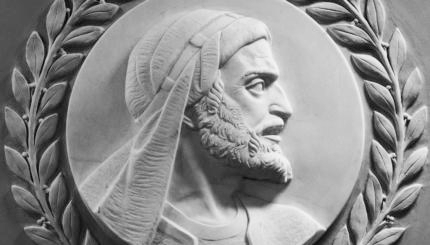Don Isaac Abarbanel was a Portuguese Jewish scholar and financier and among the most important Jewish figures of the late medieval period. He is considered the last in a line of Jewish statesman-scholars of the Spanish Golden Age, individuals accomplished in both Jewish learning and affairs of state. Born to a prominent and wealthy Jewish family that claimed descent from King David, Abarbanel (sometimes rendered as Abravanel) served as a royal financier while authoring biblical commentaries and religious treatises of enduring influence. Living at a time of tremendous upheaval, he was forced into exile multiple times in his life, moving from Portugal to Spain to Italy.
Abarbanel was born in Lisbon in 1437. His family roots were in Spain, where his grandfather, Samuel Abarbanel, converted to Christianity under duress. His father, Don Judah, continued in the family tradition of serving as financiers to Spanish and Portuguese royalty. As befitting a family of his stature, he was educated in Latin and classical Greek and Roman philosophy. Like his forebears, he was also deeply knowledgeable about the intricacies of banking and finance. By the 1460s, Abarbanel had won the favor of several Iberian nobles — including King Alfonso V, to whom he had provided unspecified “special services,” per a 1472 letter to the Italian Jewish banker Yehiel of Pisa, a source that sheds significant light on Abarbanel’s activities in this period.
The letter is the source of a story about Abarbanel’s involvement in ransoming the Jews of Arzilla, on the northern coast of Morocco, which was captured by Portugal in 1471. Some 250 Jews were enslaved in the conquest, and Abarbanel reports in the letter that he spent six months traveling the country to meet with the enslaved Jews and deal with their masters. Abarbanel was ultimately able to secure their release at a cost of 10,000 gold doubloons and provide for their rehabilitation.
With the support of the king, Abarbanel accrued great wealth in Portugal and emerged as the foremost leader of the Jewish community. He also had three sons and produced much scholarly work. But all of that came to an end with Alfonso’s sudden death at 49 in 1481, after which Abarbanel came under suspicion of having conspired in a plot against the new king, prompting him to flee for his life. He arrived in Castile in 1483, losing his lands and estate in the process. Two years later, he would be sentenced to death in absentia.
With your help, My Jewish Learning can provide endless opportunities for learning, connection and discovery.
In Spain, he would make enormous progress in his biblical commentary, penning volumes on several books of the Prophets that not only integrated observations about politics born of his own experience, but the views of Christian thinkers too. He also managed to reconstitute his wealth and influence, becoming an important financial figure in the court of Ferdinand and Isabella of Spain. But this too would not last. In 1492, the monarchs signed an edict of expulsion against what was then the most important Jewish community in Europe. Abarbanel secured several audiences with the king in an attempt to change his mind, including the offer of a substantial bribe. When that was unsuccessful, he turned to the queen. According to an account by the historian Benzion Netanyahu, Abarbanel warned her that Jews could not be destroyed and that those who tried invited their own destruction. Isabella responded by invoking theology: “‘Do you believe that this comes upon you from us? The Lord hath put this thing into the heart of the king.”
Choosing to join his coreligionists in exile rather than convert, Abarbanel fled again. In the years that followed, he never stayed in one place for long. He landed first in Naples, where once again he was able to reconstitute his wealth and show himself useful to the ruling authorities. But his sojourn in Naples would also be short lived. In 1495, he fled to Corfu, then to Monopoli and finally to Venice. Though he was frequently on the run, these were highly productive years for Abarbanel, during which he continued work on his extensive biblical commentaries and wrote other works on philosophy and theology.
Abarbanel’s philosophical writings were deeply influenced by the work of another Iberian-born scholar. Rosh Amanah, published two years after he arrived in Naples, is one of several tracts he wrote analyzing the thought of Maimonides, in this case critiquing Maimonides’ famous 13 principles of faith. Abarbanel argued that Judaism should not be reduced to a set of core dogmas. All of Jewish thought is the heart of Judaism, Abarbanel claimed, with no specific principles standing above the others.
Abarbanel’s later writings also dealt extensively with messianism, a fact often attributed to the repeated exiles he experienced in his own life, and in particular the trauma and upheaval faced by Spanish Jewry in 1492. In Italy, Abarbanel authored three volumes on the subject, often grouped together under the title Migdol Yeshuot (“Tower of Salvation”), which the Bible scholar Eric Lawee claims to be the most substantial body of messianic thought ever produced by a Jewish writer. In one volume, Abarbanel said the messiah was already alive, born before the expulsion from Spain. He claimed evidence for the messiah’s imminent arrival could be located in the stars, in particular in the conjunction of Jupiter and Saturn in Pisces in 1464. He even went so far as to name 1503 the year in which the messiah would arrive — a date he advanced by a year (and then several more) after the messiah failed to materialize.
But Abarbanel is perhaps best-known today for his biblical commentaries, which he began in Portugal and completed in the last years of his life. According to Netanyahu, Abarbanel could produce these quickly; in less than five months in 1483-84, he produced commentaries on four books of the Prophets totaling some 400,000 words. Unlike Rashi, who was known for his concision, Abarbanel’s commentary is verbose. He doesn’t offer commentary on individual verses, but rather long expositions of particular subjects, often beginning a chapter with a list of numbered questions that he would then set about answering at length. He also often punctuated his commentaries with elucidations born of his lived experience. The introduction to his commentary on Deuteronomy, for example, features an account of his flight from Spain.
Around 1503, Abarbanel landed in Venice, where he would spend the final years of his life. He continued his scholarly pursuits as a writer and his political involvement, helping to negotiate between Venice and Portugal over the spice trade. He died in Venice in 1508 and was buried in nearby Padua.
Torah
Pronunced: TORE-uh, Origin: Hebrew, the Five Books of Moses.



